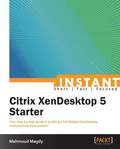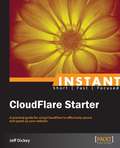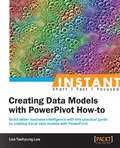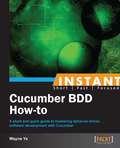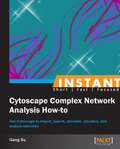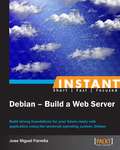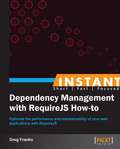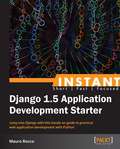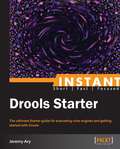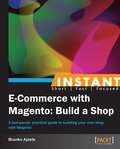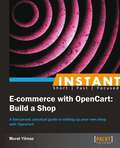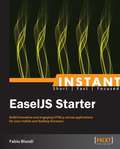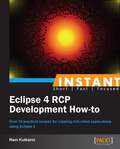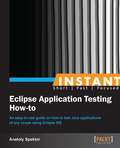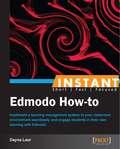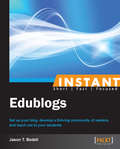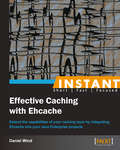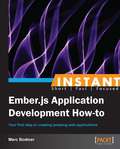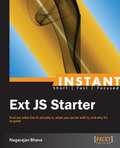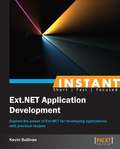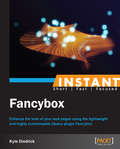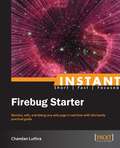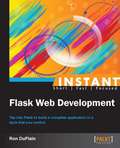- Table View
- List View
Instant Citrix XenDesktop 5 Starter
by Mahmoud MagdyGet to grips with a new technology, understand what it is and what it can do for you, and then get to work with the most important features and tasks. This easy-to-follow, hands-on guide shows you how to implement desktop virtualization with real life cases and step-by-step instructions. It is a tutorial with step-by-step instructions and adequate screenshots for the installation and administration of Citrix XenDesktop.If you are new to XenDesktop or are looking to build your skills in desktop virtualization, this is your step-by-step guide to learning Citrix XenDesktop. For those architects and designers experienced in XenDesktop infrastructure implementation this book aims to be a quick reference guide with notes and reminders for their day-to-day tasks.
Instant CloudFlare Starter
by Jeff DickeyWritten as a practical guide, CloudFlare Starter will show you all you need to know in order to effectively improve your online presence in a multitude of different ways."CloudFlare Starter" is a practical yet accessible guide for website owners looking to optimize their site for optimum security and maximum performance.
Instant Creating Data Models with PowerPivot How-to
by Leo Taehyung LeeFilled with practical, step-by-step instructions and clear explanations for the most important and useful tasks. This is a practical, recipe-based book, taking the reader through the hands-on steps required to set up and use PowerPivot with as little fuss as possible.This is an introductory book on PowerPivot for basic Excel users who handle lots of data and are willing to go beyond the limitations of Excel without the need to learn a new language from scratch.
Instant Cucumber BDD How-to
by Wayne YeFilled with practical, step-by-step instructions and clear explanations for the most important and useful tasks. This standard How-to guide explains the essence of Cucumber, describing how to write Cucumber features to drive development in a real project, and also describe many pro tips for writing good Cucumber features and steps.Instant Cucumber BDD How-to is great for an Agile software development team that wants to adopt a behaviour-driven process using Cucumber. It assumes that the team is passionate in reducing communication gaps between developers and product managers, ensuring the development is always on the right track and always focused on minimum marketable value.
Instant Cytoscape Complex Network Analysis How-to
by Gang SuFilled with practical, step-by-step instructions and clear explanations for the most important and useful tasks. Get the job done and learn as you go. A how-To book with practical recipes accompanied with rich screenshots for easy comprehension.This How-to guide offers techniques and skills through recipes. The guide is packed with step-by-step instructions for anyone who wants to learn to use Cytoscape for visualizing networks.This book is great for people who have basic knowledge of programming, network analysis, and Cytoscape usage but would like to visualize and explore some network data. Readers are expected to know the basic concepts of network data, and be capable of using text editing software to edit tabular data which is imported into Cytoscape. Optionally, the user should understand network clustering and command line tools such as R.
Instant Data Intensive Apps with Pandas How-to
by Trent HauckFilled with practical, step-by-step instructions and clear explanations for the most important and useful tasks. This book has a practical approach with step-by-step recipes to help readers get to grips with Pandas.Users of other data analysis tools will find value in seeing tasks they commonly encounter translated to Pandas and users of Python will encounter an introduction to a very impressive tool in a syntax they inherently know. In terms of general skills, it is assumed that the reader understands basic data structures such as arrays or lists dictionaries or hash map as well as having some understanding of command line work. Installing Pandas is not covered, but the online documentation is straightforward. Also, readers are encouraged to use IPython to interact and experiment with the code.
Instant Debian: Build a Web Server
by Jose Miguel ParrellaFilled with practical, step-by-step instructions and clear explanations for the most important and useful tasks. A concise guide full of step-by-step recipes to teach you how to install and configure a Debian web server.This is an ideal book if you are an administrator on a Development Operations team or infrastructure management, who is passionate about Linux and their Web applications but have no previous experience with Debian or APT-based systems.
Instant Dependency Management with RequireJS How-to
by Greg FrankoFilled with practical, step-by-step instructions and clear explanations for the most important and useful tasks.A concise guide that delivers immediate results with practical recipes on customizing your projects.This book is for intermediate to advanced JavaScript developers who are interested in learning more about AMD specification and RequireJS.
Instant Django Application Development Starter
by Mauro RoccoGet to grips with a new technology, understand what it is and what it can do for you, and then get to work with the most important features and tasks. This book is written in a practical Starter style with lots of helpful screenshots and step-by-step tutorials which will guide you gently into the world of Django.This book is for Python developers who want to jump into the world of Django. If you want to create awesome Python web applications without sacrificing speed then this book is for you. This book will also appeal to people learning Python who wish to hit the ground running and develop Python applications quickly and efficiently.
Instant Drools Starter
by Jeremy AryGet to grips with a new technology, understand what it is and what it can do for you, and then get to work with the most important features and tasks.A simple Starter, introducing the Drools concept. The book takes a meticulous approach to providing quick and simple solutions in a practical manner for rules engines and their uses.This book is great for developers, architects, and managers who need to evaluate or get up to speed with Drools engine usage and functionality. This book teaches you to capture and document business processes and represent their maintenance development to business users.
Instant E-Commerce with Magento: Build a Shop
by Ajzele BrankoFilled with practical, step-by-step instructions and clear explanations for the most important and useful tasks. Get the job done and learn as you go. "Instant E-Commerce with Magento: Build a Shop" is written in a friendly, helpful style which takes you through several distinct recipes all geared to getting you started with Magento and selling your products as quickly and as efficiently as possible. The only thing you need to bring to the table is a desire to sell your products online.This book is for anyone who wants to learn how to quickly set up, configure, and manage an online shop with Magento. Regardless of whether you are technically skilled or not, this book will show you show to create a fully functioning e-commerce solution
Instant E-commerce with OpenCart: Build a Shop How-to
by Murat YilmazFilled with practical, step-by-step instructions and clear explanations for the most important and useful tasks. "Instant E-Commerce with OpenCart: Build a Shop How-to" is written in a friendly, helpful style which takes you through several distinct recipes, all geared to getting you started with OpenCart and selling your products as quickly and as efficiently as possible. The only thing you need to bring to the table is a desire to sell your products online."Instant E-Commerce with OpenCart: Build a Shop How-to" is for anyone who wants to learn how to quickly set up, configure, and manage an online shop with OpenCart. Regardless of whether you are technically skilled or not, this book will show you how to create a fully functioning e-commerce solution.
Instant EaselJS Starter
by Fabio BiondiGet to grips with a new technology, understand what it is and what it can do for you, and then get to work with the most important features and tasks.A short and precise guide to get you started with EaselJS , helping you to create some cool applications and games. EaselJS greatly simplifies application development in HTML5 Canvas using a syntax and an architecture very similar to the ActionScript 3.0 language. As a result, Flash / Flex developers will immediately feel at home but it's very easy to learn even if you've never opened Flash in your life. The book targets Web designers, animators, Digital content producers, and Flash and Flex developers. It's assumed that you will have some experience in HTML and pure JavaScript.
Instant Eclipse 4 RCP Development How-to
by Ram KulkarniFilled with practical, step-by-step instructions and clear explanations for the most important and useful tasks.A concise guide that delivers immediate results with practical recipes on learning practical hints and avoiding pitfalls in Eclipse 4 development.You will find this book useful if you are looking to create cross-platform rich client applications. Eclipse platform is built with Java, so basic knowledge of Java is essential. The focus of this book is to understand the new APIs and concepts of the Eclipse 4 platform. Prior knowledge of basic concepts of the Eclipse framework (plugin, extension, perspective, workspace, and so on), SWT (Standard Widget Toolkit), and JFace would be beneficial in understanding the examples in this book quicker.
Instant Eclipse Application Testing How-to
by Anatoly SpektorFilled with practical, step-by-step instructions and clear explanations for the most important and useful tasks .The approach is in a tutorial style that will guide the users in an orderly manner toward application testing.This book is for developers of any level, starting from people who have never used Eclipse and ending with advanced developers who want to switch to Eclipse IDE and start debugging their apps using Eclipse. Most of the recipes in this book are very easy to follow, so no prior knowledge of Eclipse IDE is required. It is advised that the reader has basic knowledge of the Java programming language.
Instant EdgeSight for XenApp
by Vaqar HasanFilled with practical, step-by-step instructions and clear explanations for the most important and useful tasks. Instant EdgeSight for XenApp is a practical, hands-on guide that contains instruction-based examples from basic to advanced level topics. Instant EdgeSight for XenApp will serve as an excellent source of information for Citrix XenApp professionals and novices alike. It is assumed that readers have experience working with Citrix products and have some sort of familiarity with monitoring.
Instant Edmodo How-to
by Dayna LaurFilled with practical, step-by-step instructions and clear explanations for the most important and useful tasks. Full of illustrative screenshots, tips, and step-by step recipes, it's a practical guide to implementing a learning management system for students in their classroom environment.The book is for educators who are looking to implement a learning management system in their classroom that will engage students, incorporate technology in a meaningful way, link parents in the learning, and provide opportunities for connections to a wider global community of educators.
Instant Edublogs
by Jason T. BedellFilled with practical, step-by-step instructions and clear explanations for the most important and useful tasks. A concise guide full of step-by-step recipes to teach you how to set up and manage your blog.Instant Edublogs is aimed at educators - teachers, administrators, support specials, and paraprofessionals - who want to share their experiences and learn from others online. While some CSS and HTML skills can be helpful for understanding some of the advanced features, no specific technical knowledge is needed.
Instant Effective Caching with Ehcache
by Daniel WindFilled with practical, step-by-step instructions and clear explanations for the most important and useful tasks. This is a Packt How-to containing hands-on recipes that discuss integrating Ehcache into your Java application.This book is aimed at Java developers who are looking for an Ehcache integration reference guide and want to get a good background in its fundamental core functionality. It is assumed that you have some experience with Java. Prior knowledge in Ehcache is not a requirement.
Instant Ember.js Application Development How-to
by Marc BodmerFilled with practical, step-by-step instructions and clear explanations for the most important and useful tasks. Get the job done and learn as you go. A how-To book with practical recipes accompanied with rich screenshots for easy comprehension.This book follows a recipe-based approach that can be used both for problem solving or getting started with Ember.JS. Regardless of your skill level you should find this book useful and beneficial to any of your application development projects.Are you a frontend developer whose code has gotten out of control? This book will also show you how you can use Ember.JS to make your web application easy to manage as it increases in complexity. Even if you've never used Ember.JS before, but have HTML and JS skills, this guide will help you get up to speed in no time.
Instant Ext JS Starter
by Nagarajan BhavaGet to grips with a new technology, understand what it is and what it can do for you, and then get to work with the most important features and tasks. Instant Ext JS Starter is a step-by-step guide to providing you with all the information that you need to start with the Ext JS Sencha JavaScript framework. It has a simplified approach in building your first browser-based application.Instant Ext JS Starter is for people who are new to the Ext JS framework and people who are trying to explore the important features and possibilities of the framework. It assumes that you will have some experience with or understand the JavaScript programming language. As this is an Instant title, it provides the features of the framework and its usage in a nutshell, helping the user to start instantly. Readers are expected to have a browser with a debugger installed, preferably Firefox with the Firebug debugger plugin.
Instant Ext.NET Application Development
by Kevin SullivanFilled with practical, step-by-step instructions and clear explanations for the most important and useful tasks. This book will show you how to get started with Ext.NET, and also provides practical examples and tips using some of the core controls with which you'll be up and running and coding rich UIs. The book also gives a brief explanation about some useful JavaScript tips and techniques to get you confident in writing your own object-orientated JavaScript for Ext.NET.This book is for anyone that wants to get started with Ext.NET. These simple, quick, and practical recipes will help you, as a developer, developer get a good grounding of client-side and server-side programming. It is assumed you have some experience of JavaScript and ASP.NET, as well as an understanding of object-orientated programming. Readers are also expected to be familiar with Visual Studio 2010, on which the examples are built.
Instant Fancybox
by Kyle DiedrickFilled with practical, step-by-step instructions and clear explanations for the most important and useful tasks. Instant Fancybox is a tutorial guide with step-by step instructions and practical examples to help you customize your web pages.Instant Fancybox is great for web developers looking to learn more about the Fancybox jQuery plugin. The book assumes a working knowledge of HTML and CSS. Readers are also expected to have a basic understanding of jQuery and JavaScript.
Instant Firebug Starter
by Chandan LuthraThis easy to understand Starter guide will get you up to speed with Firebug quickly and with little effort. Hands-on and practical examples allow you to get a feel for the tool and get used to using it on a day-to-day basis. If you are just starting out with web development and looking to improve your site with Firebug, then this guide is for you. If you have a basic understanding of web development then this guide is easy to follow and will benefit your site no end.
Instant Flask Web Development
by Ron DuplainFilled with practical, step-by-step instructions and clear explanations for the most important and useful tasks. The book uses a bottom-up approach to help you build applications, and is full of step-by-step instructions and practical examples to help you improve your knowledge.Instant Flask Web Development is for developers who are new to web programming, or are familiar with web programming but new to Flask. This book gives you a head start if you have some beginner experience with Python and HTML, or are willing to learn.
